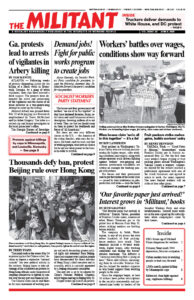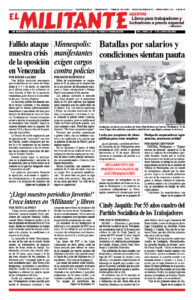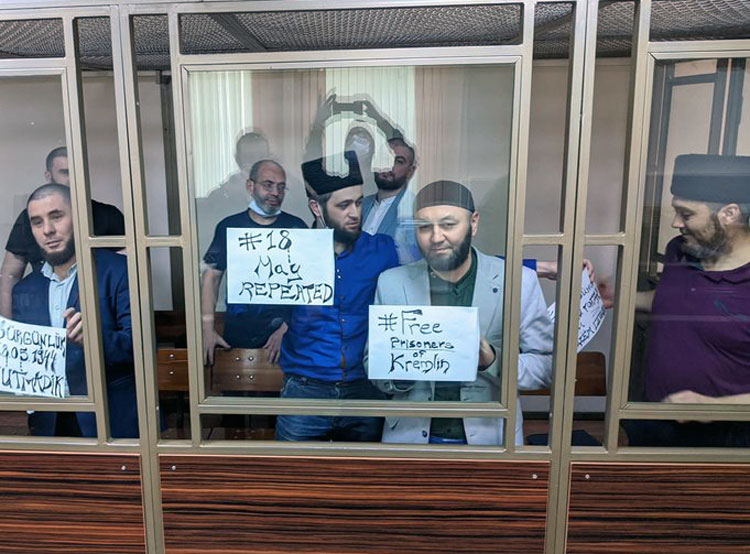On May 18 a group of Crimean Tatars put on trial by Moscow on trumped-up terrorism charges staged a daring protest during a military court hearing in Rostov-on-Don in Russia. Placed behind a glass cage for the hearing, the seven men held up signs smuggled in by fellow fighters reading, “Free prisoners of Kremlin,” “Kept our dignity in the past, will keep it now,” and “Don’t forget the exile 5/18/1944.”
That date was when the Stalinist regime in Moscow carried out the mass deportation of the entire Crimean Tatar population, taking them hundreds of miles east from Crimea to Central Asia and Siberia. Soviet Premier Joseph Stalin slandered them all as agents of the Nazis during the World War II German occupation of Crimea.
The anniversary of that deportation is memorialized every year by Crimean Tatars wherever they are.
The Tatar people were allowed less than an hour to collect their belongings. In two days 200,000 people were herded into railroad cattle cars behind locked doors with few provisions and little water. During the expulsion and over the next two years almost half of them died. Over the following five decades those who survived fought for their right to return to Crimea.
One of the leaders of that fight — Mustafa Dzhemilev — became one of the best-known opponents of the Stalinist rulers, speaking out for all those under their boot. He spent 15 years in prison in the Gulag. He was less than a year old when he and his family were rounded up in the 1944 deportation.
“The Crimean Tatar people aren’t even a national minority,” he said in a 2018 interview, “but the indigenous people of Crimea.”
Crimea seized by Russia in 1783
Crimea was conquered by the Russian czarist army in 1783 and occupied until 1991. The only part of this period when there was a flowering of independence was following the Bolshevik Revolution of 1917. The Tatars established an autonomous socialist republic, as did the Ukrainians. Native culture flourished and national pride grew.
But in the late 1920s a growing bureaucratic layer led and epitomized by Stalin carried through a bloody counterrevolution against the policies of the Bolsheviks. National rights were trampled, in both Crimea and Ukraine.
After the collapse of the Soviet Union in 1991, big waves of Tatars started returning home. They began rebuilding their cultural and political life, set up their own national assembly — the Mejlis — and elected their own leaders. Dzhemilev was elected as leader of the Mejlis.
Tatar-run schools opened up. Newspapers and other media channels in the Tatar language were started and traditional customs and celebrations reappeared.
Today, after decades of first czarist and then Stalinist efforts to repopulate the peninsula with ethnic Russians, the Tatars account for approximately 12% of the Crimean population. They are part of some 200 million people in the world speaking a Turkic language and practicing Islam.
This rebirth of Tatar national life was abruptly brought to an end when the Vladimir Putin regime in Moscow seized Crimea, a part of Ukraine, in February 2014, after popular mass mobilizations overthrew the pro-Moscow Ukrainian government of Viktor Yanukovych. Since then the Russian government has cracked down on all opposition in Crimea, with the Tatars being especially hard hit.
Newspapers and media are prohibited, schools closed down and cultural institutions shut. Events honoring the lives of those who perished in the 1944 expulsion are forbidden. That makes the May 18 action in the courtroom in Rostov-on-Don even more significant.
The cops of the FSB, the Russian security service, routinely harass and interrogate Crimean Tatars, forcing their way into people’s homes between 4:00 and 6:00 in the morning brandishing automatic weapons to terrorize families.
The Crimean Tatar Resource Center reports a ninefold increase in politically motivated arrests from 2017 to 2019. One hundred fighters for Tatar national rights — including those who carried out the Rostov courtroom protest — are currently held in Russian prisons.
Moscow banned the Mejlis in April 2016, calling it an extremist organization. This March the Russian government filed criminal charges against Refat Chubarov, chair of the assembly after Dzhemilev stepped down in 2013, claiming he “organized mass riots.” In April Dzhemilev was retroactively charged with defying a ban from Moscow when he entered his native country in May 2014. He now faces new criminal charges in exile for attempting to return to his own homeland.
During Moscow’s six-year occupation, the composition of the population in Crimea has continued to undergo changes. According to Moscow’s statistics, some 250,000 people have moved to Crimea from Russia. At the same time some 140,000 Crimeans have left. Most of them are Ukrainians, but more than 25,000 Tatars have been forced to flee.
What goes on now is a repetition “in a somewhat distorted form of what happened in 1944,” Dzhemilev said in a recent interview. Although today Moscow doesn’t put people “in cattle cars as they did in Stalin’s time, they are creating conditions so that the Crimean Tatars will leave Crimea.”


